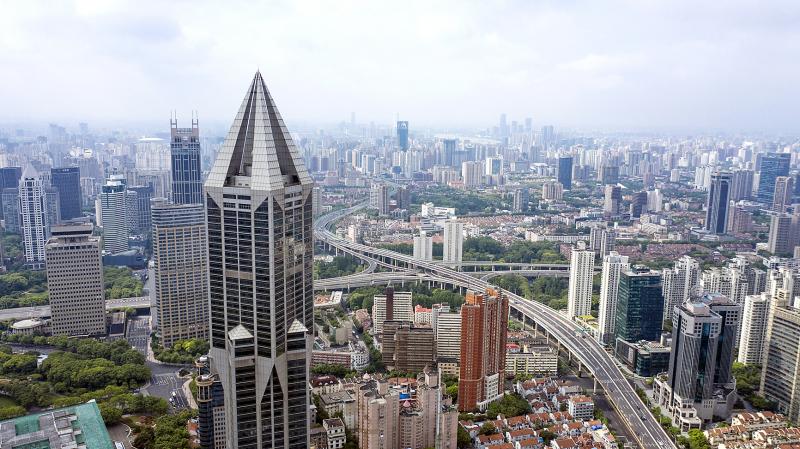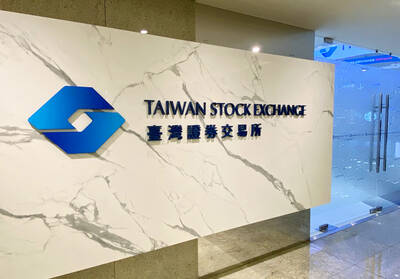Toyota Motor Corp is suspending more production due to parts shortages caused by the COVID-19 lockdown in Shanghai, a sign that supply-chain bottlenecks could persist even as the city starts to gradually reopen.
The world’s biggest automaker issued a statement yesterday listing production lines that would be suspended in Japan, including at five plants early next month on top of stoppages already announced for this month.
“The shortage of semiconductors, spread of COVID-19 and other factors are making it difficult to look ahead,” Toyota said in the statement. “Due to parts supply shortages caused by the lockdown in Shanghai, we have decided to suspend operations in May and in June.”

Photo: Bloomberg
Toyota’s global production plan for next month stands at about 850,000 vehicles, 250,000 of which are to be made in Japan and the rest overseas. The company aims to produce an average of 850,000 units a month through August and is keeping its fiscal year output target of 9.7 million vehicles.
“We will continue to make every effort possible to deliver as many vehicles to our customers at the earliest date,” Toyota said.
Shanghai, which went into lockdown in March to combat a COVID-19 outbreak, has been moving to officially ease restrictions that have severely disrupted business activity and kept millions of people stuck in their homes.
While curbs are loosening, the lockdown might continue to cause “a considerable amount of damage to global supply chains” as backlogs hinder the movement of goods, the UK-based Business Continuity Institute has said.
Earlier this month, Toyota forecast a 20 percent decline in operating profit for this fiscal year due to an unprecedented increase in logistics and raw materials costs.

Taiwan Semiconductor Manufacturing Co (TSMC, 台積電) secured a record 70.2 percent share of the global foundry business in the second quarter, up from 67.6 percent the previous quarter, and continued widening its lead over second-placed Samsung Electronics Co, TrendForce Corp (集邦科技) said on Monday. TSMC posted US$30.24 billion in sales in the April-to-June period, up 18.5 percent from the previous quarter, driven by major smartphone customers entering their ramp-up cycle and robust demand for artificial intelligence chips, laptops and PCs, which boosted wafer shipments and average selling prices, TrendForce said in a report. Samsung’s sales also grew in the second quarter, up

LIMITED IMPACT: Investor confidence was likely sustained by its relatively small exposure to the Chinese market, as only less advanced chips are made in Nanjing Taiwan Semiconductor Manufacturing Co (TSMC, 台積電) saw its stock price close steady yesterday in a sign that the loss of the validated end user (VEU) status for its Nanjing, China, fab should have a mild impact on the world’s biggest contract chipmaker financially and technologically. Media reports about the waiver loss sent TSMC down 1.29 percent during the early trading session yesterday, but the stock soon regained strength and ended at NT$1,160, unchanged from Tuesday. Investors’ confidence in TSMC was likely built on its relatively small exposure to the Chinese market, as Chinese customers contributed about 9 percent to TSMC’s revenue last

Taiwan and Japan will kick off a series of cross border listings of exchange-traded funds (ETFs) this month, a milestone for the internationalization of the local ETF market, the Taiwan Stock Exchange (TWSE) said Wednesday. In a statement, the TWSE said the cross border ETF listings between Taiwan and Japan are expected to boost the local capital market’s visibility internationally and serve as a key for Taiwan becoming an asset management hub in the region. An ETF, a pooled investment security that is traded like an individual stock, can be tracked from the price of a single stock to a large and

Despite global geopolitical uncertainties and macroeconomic volatility, DBS Bank Taiwan (星展台灣) yesterday reported that its first-half revenue rose 10 percent year-on-year to a record NT$16.5 billion (US$537.8 million), while net profit surged 65 percent to an unprecedented NT$4.4 billion. The nation’s largest foreign bank made the announcement on the second anniversary of its integration with Citibank Taiwan Ltd’s (花旗台灣) consumer banking business. “Taiwan is a key market for DBS. Over the years, we have consistently demonstrated our commitment to deepening our presence in Taiwan, not only via continued investment to support franchise growth, but also through a series of bolt-on acquisitions,” DBS